10 Awesome MG Authors Share Their Personal Stories
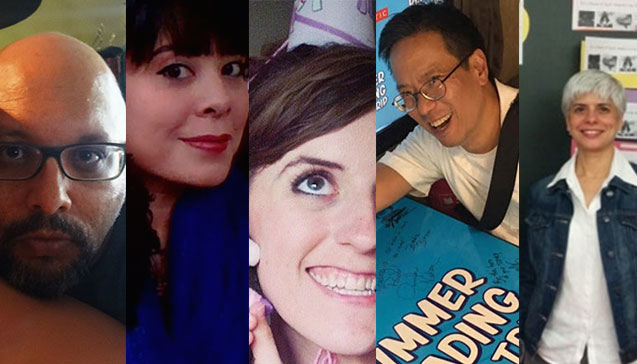
Kidlit Open Mic is a spinoff of the YA Open Mic series that occurs each month over on our Teen blog.
For this series, we ask authors to share stories on topics of their choice. The stories can be as funny or as serious as the authors want. We just want to hear about something that is important to them, so you can get to know on a more personal level the awesome people behind the books you love.
This month, we’re featuring ten middle grade authors. In a few months, we’ll switch things up and share stories from equally amazing picture book authors.
If you like what you read, don’t forget to check out their books!
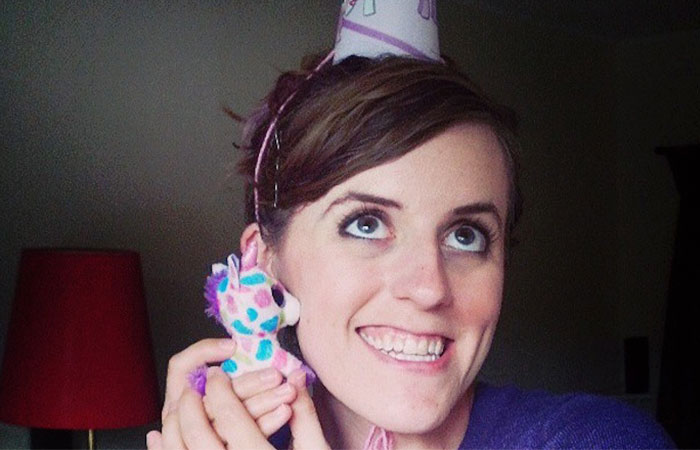
Claire Legrand, author of Some Kind of Happiness
Finley Hart, the main character of my latest book, Some Kind of Happiness, is an 11-year-old with anxiety and depression.
Like Finley, I too have anxiety and depression.
And, like Finley, sometimes it’s hard for me to ask for help.
When I was in fifth grade, I had my first anxiety attack—nausea, itchy skin, elevated heart rate, frantic thoughts. I didn’t know what those feelings were, but I knew they weren’t normal. I didn’t want to be weird; I didn’t want to worry my parents. So I didn’t tell anyone. It was just a strange thing that happened. No big deal. It was my little secret.
As I got older, my anxiety and depression took a different form: Obsession with achievement. That’s the tricky thing about mental illness—it looks and feels different for everyone. If I didn’t get a good grade, or if I played poorly at a band audition, I hated myself. I couldn’t see my value as a human being unless I had the perfect grades, the gleaming trophies, the glowing praise.
It took me years to understand that something was wrong with me, and to ask for help—to talk to my friends and family members honestly and stop hiding things from them. It’s scary to be honest, especially with people you love. But I wish I had done it sooner. I wish that, like Finley, I’d had the courage to ask for help at a young age. Maybe after that anxiety attack in fifth grade. Maybe in middle school and high school, when the pressure to succeed felt like a beast on my back—weighing me down, whispering in my ear how I would never be good enough.
Anxiety and depression. Say it out loud. Say it with me. Anxiety and depression. Mental illness. Mental health.
Those words may sound scary, and sometimes they feel scary, but they are simply tools we use to help each other and help ourselves.
As Finley says, “They are only words. They are only part of me, and I am still here. I do not need to be afraid of them.”
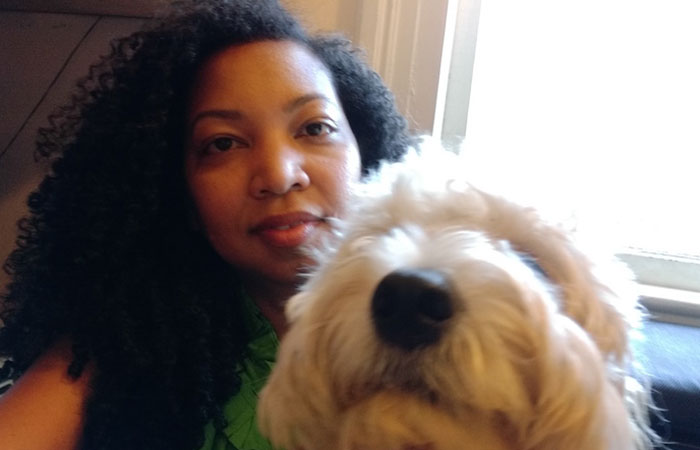
Tracey Baptiste, author of The Jumbies
There was an Indian family in a hotel I was staying at last fall. They were a large group that spilled into the lobby area. Kids clambered over the upholstered chairs, dashed after each other, colliding with women in saris, their gold bangles shaking, their hair glistening as it roped down their backs. As I waited for my ride, I listened as they talked in heavy accents, as the boisterous children giggled around them. I loved them. I wanted them to see me. I wanted them to recognize me as one of them.
Most people label me as African American. My mother has African ancestry, plus some other stuff (we’re not sure, but I bet that red hair is Irish). My father is of Indian ancestry plus maybe Syrian. (I need to do one of those DNA swipe kits. Seriously.) But African is the only thing people see when they look at me. Though any brown person with skin the many varying shades between the darkest brown and the palest white, is mixed. They are not only African. Forced slavery, international travel, and in my case the mingling of former slaves with indentured laborers has made every brown person a mixture of various parts of the world.
We carry the globe in our skin, in our blood. We are everything rolled into one. We are living breathing diversity. It sounds wonderful. It sounds beautiful. But it isn’t always viewed that way. It’s a hard thing when people only see you one way, but you are so much more.
I wanted to talk to that family. I wanted to tell them about my cousins who I clamored with over chairs, shouting and giggling. But I didn’t. I didn’t know what to say. And then my ride came so I left the lobby. They never saw me.
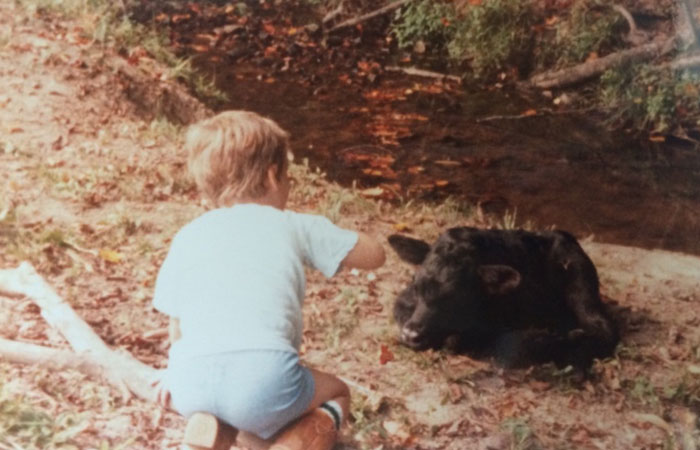
Brooks Benjamin, author of My Seventh-Grade Life in Tights
The farm was a blessing as much as it was a curse. On one hand, I loved spending my summers swinging across the creek into our field. I was the only kid for miles and that cow-pattied pasture was my kingdom.
But it got lonely.
Fast.
My family tended to stay quiet. Never get too personal. Keep it positive. Depression, OCD, bipolar disorder, addiction—these were all things that surrounded me growing up. But I couldn’t ask questions. Not about any of that. Even when a fist fight would break out in the kitchen. Even when I had to help carry someone to bed because they’d passed out. Even when I heard mentions of suicide.
I had to stay quiet.
I couldn’t get personal.
I needed to keep it positive.
Early on, I adopted this sort of “don’t let them see you cry” mentality. I never told my friends about what I saw at home. I was too scared to invite them over to spend the night. So I went to school and smiled. I loved my parents and they loved me. But I needed answers. Because I eventually began noticing the mirror in front of me. The obsessive hair pulling, the bouts of emotional numbness, the occasional periods of euphoria. I hid it all like I was raised to do. And it took me until fairly recently to realize how unhealthy that is. It wasn’t until my wonderful wife helped me understand that talking about it is exactly what I should do. Her openness gave me the freedom to finally talk.
I miss the farm. I miss my parents. But I don’t miss the loneliness.
So now I choose to talk.
Now I choose to let people in.
Now I choose to be honest.
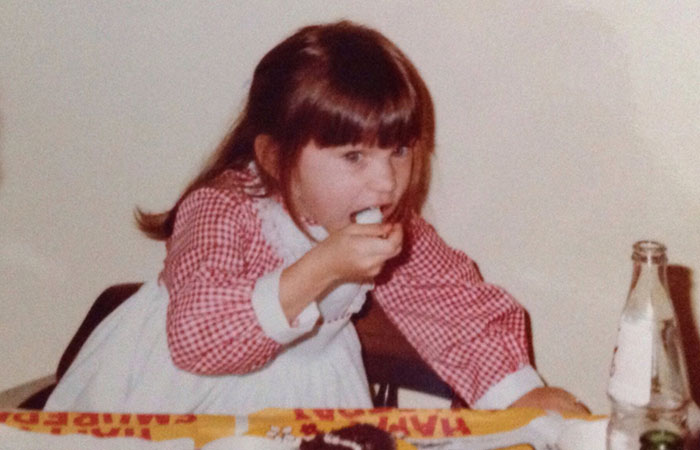
Melanie Conklin, author of Counting Thyme
When I was six years old, I went for the standard hearing test that all of us take at some point in school: you put on a pair of heavy headphones that completely block out the world and wait to hear the beeps. You’re supposed to raise your hand when you hear one. Usually there are pauses of varying lengths, designed to keep you from guessing and messing up the results.
As I sat there waiting to hear something, I remember thinking that it was taking forever to get started.
Like, forever.
Finally, I started hearing beeps and raised my hand eagerly when I did. I wanted to do a good job. I always tried my best in school.
When I took off the headphones, I found out that I had failed the test. That didn’t make a ton of sense, because I could hear. But off we went to an audiologist, where I sat in a small, dark booth wearing heavy headphones, waiting to hear sounds again.
It turned out that the meningitis that had threatened my life as a toddler had also destroyed the nerves in my right ear. I was profoundly deaf on that side.
Most of the time, I really didn’t mind being hard of hearing, but there were moments when I resented it. Playing Marco Polo in the pool. Playing Telephone at a slumber party. Kids could be jerks—taunting me, calling me names—but I never thought of myself as anything less than what I wanted to be, thanks to loving parents and teachers and books.
As I grew up, I found out that the people who mattered most were the ones who loved me. When it came to the others, I learned to plug the other ear.

Mahtab Narsimhan, author of Mission Mumbai
To this day, I swear I don’t recall reading any instructions in the Driver’s Handbook about engaging with fire trucks. And if it was there, it should have been in red!
I immigrated to Canada in 1997 and got my driver’s licence shortly after. Being a new driver I was careful to observe the rules, especially speed limits.
Driving down a narrow residential street in Toronto, I heard a fire truck roar up behind me. The speed limit in the area was 50km/h but they were obviously in a hurry and couldn’t overtake me, so I did them a favour and speeded up.
The fire truck came closer.
I inched up to 60 km/h. Bigger favour!
The fire truck’s front grill filled up my rear-view mirror.
I cursed. I swore. Did the driver, a city employee, really expect me to break the rules and speed limit to go up to 70km/h? What if I got a speeding ticket and marred my perfect record? Idiots!
I held my ground. And my speed.
The siren was deafening and relentless.
And then the penny dropped. The proverbial light bulb went on.
My tiny Daewoo hatchback was the only thing on the road with a fire truck on my tail. Every other car had pulled off to the side. I swerved out of the way, almost climbing on to the sidewalk. The engine hurtled by with an ear-splitting shriek.
Over the next few days I obsessed over the mail, sure of a letter revoking my licence. Thankfully I still have it and I’m the first to pull over when I hear the siren.
Note to self: Never try to outrun a fire truck.
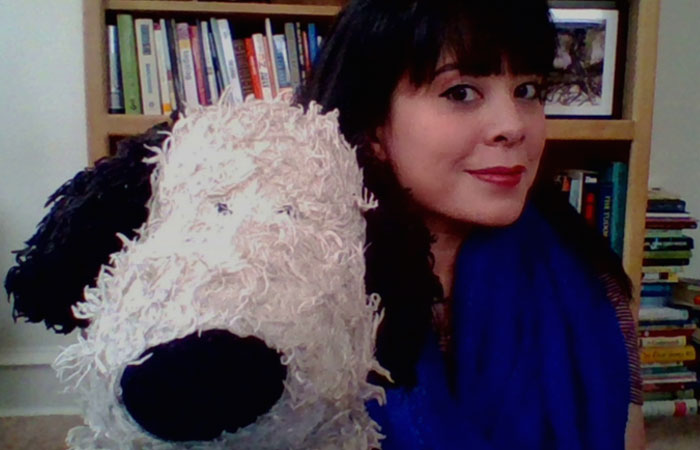
Erin Entrada Kelly, author of The Land of Forgotten Girls
I used to whisper secrets to the couch cushions. My pillows, too.
I once believed that if I covered myself with blankets that reached all the way to my chin, the imaginary burglars wouldn’t get me.
When I was a little girl, inanimate objects were sentient beings—my stuffed animals, bookcase, tea set. Even the coffee table. I thought they all had feelings. If I chose a single stuffed animal to sleep next to me, I apologized to the other ones. I’d lay there and wonder what the unselected were thinking. Why didn’t she pick me?, they’d ask. I’d bring more over to the bed. But there were so many, I could never bring them all. Tomorrow I’ll pick you, I’d tell them. And I put them on a rotation.
When I walked down the sidewalk, I tried not to step on any ants.
It was exhausting being little. There were too many things to consider. So I made a terrible mistake: I grew up. I realized that coffee tables can’t feel pain. I learned that there was no time to sidestep ants on the sidewalk. Too much to do. Move, move, move.
It’s exhausting being an adult.
I’m a grown-up now, supposedly. I understand that sofas don’t keep secrets. But I refuse to believe that Jellycat—my stuffed, spotted dog—can’t hear me when I talk to him. He’s my favorite.
Don’t tell the others.

Jenn Bishop, author of The Distance to Home
The other girls in seventh grade were saving up for Doc Martens or whatever else was the latest fashion in the mid-nineties
Not me.
I was saving up for an American Girl doll, the kind whose hair, eye, and skin color you could select yourself, that had just debuted that year. I know, I know. By twelve, I should’ve been long done playing with dolls. They should’ve been packed up in my closet, not still inhabiting the dormer in my bedroom, which I’d set up like a real room for the two of them, complete with beds and beside tables and a wardrobe—even their own Christmas tree each December. But the thing was, I couldn’t quite let go of them. I wasn’t ready to say goodbye to Kirsten (who I’d updated for the 20th century) or Lauren (just bought with my hard-earned baby-sitting money). They had complex lives of their owns. Friend drama and boyfriends (tiny black and white pictures I’d snipped from Teen Beat and put in their wallets—Rider Strong and J.T.T., respectively, those lucky girls!). They were as real to me as my real-life friends, or maybe in some ways, more real. I knew their secrets and struggles. And they were there for me, 24/7.
Something happened later that year, though. A change I hadn’t anticipated. I let go of those stories in my head that played out with my dolls. I don’t remember the day I dismantled their room. Did I make myself do it? Or had one of my close friends made a comment about the fact that I still played with dolls?
It was only much later in college that I plundered my closet for all my past selves and remembered the girl who made stories with her dolls.
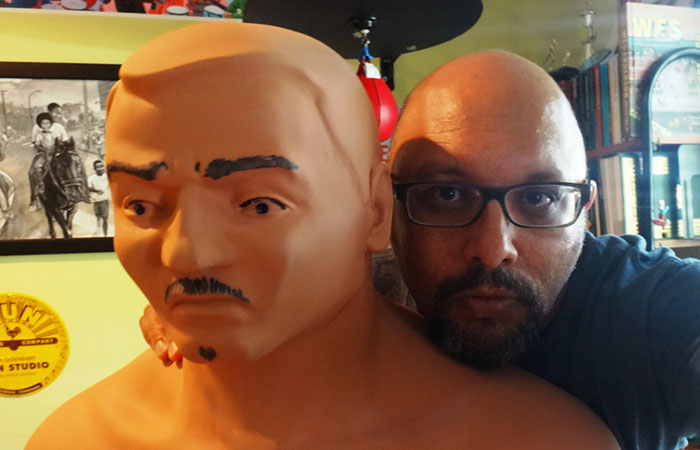
G. Neri, author of Tru & Nelle
At my worst point, I remember being unable to read—literally. Just forcing my eyes to move back and forth sent me reeling into vertigo spin. I’d been bed bound three months after surgery for a mystery disease called Meniere’s that’d knocked me out of University when I was 22. I was told by the best doctors in the world there was nothing else they could do; I would have to make due. Making due meant being bed-bound for months, barely able walk, and unable see straight most the time. Meniere’s attacks your inner ear: one minute you’re completely normal, the next—you’re plunging into the worst hangover of death ever created in a matter of seconds. Recovery takes days or weeks. I’d been having attacks back to back, which meant the normal part of me was gone. Which meant I couldn’t do anything—but think. Which I did a lot of. Like about how my life was over. How I’d never go back to school or get a job or have another relationship. Or how my parents would be stuck taking care of me for the rest of my life.
Every disease is a puzzle you have to solve to get better. But having nothing to do but think is good for puzzle-solving. After western medicine had given up on me, I got angry and learned to take control of my body. It was a slow and agonizing 3 years of struggle and experimentation, moving 3 steps forward and 2 back. I played the theme song to Rocky over and over just to have a reason to wake up in the morning. I used a lot of alternative healing and innovative research that was in the works. But eventually, I fought back to “normal.” And because I beat the odds (and the experts), it changed my perspective on everything. No longer would I believe anyone who told me something was impossible. My disease showed me anything was possible.
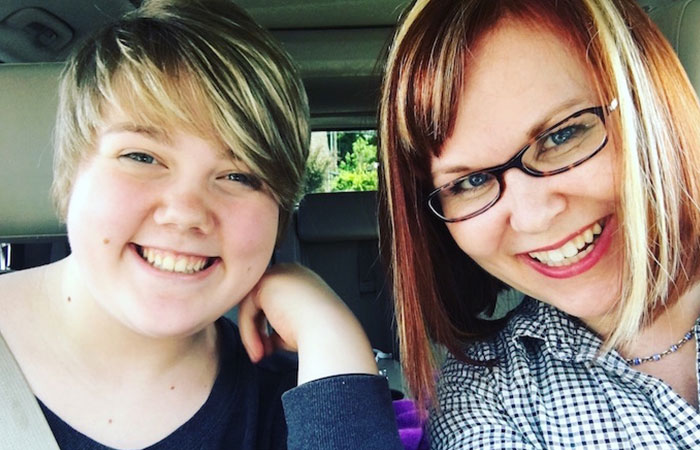
Heidi Schulz, author of Hook’s Revenge
I discovered that I have a crippling fear of heights while standing atop a Mayan pyramid. The panic attack took me utterly by surprise. As a teen, I loved to spend summer days hurling myself from a high bridge into a deep mountain stream thirty feet below. (Yes, I did have the “If your friends all jumped off a bridge, would you do it too?” conversation with my mother. I fully enjoyed the irony of saying, “Of course. But I usually go first.”) Dangerous things made me feel invincible. The burden of fear was for my parents to carry on my behalf.
On that day, long after my teen years were behind me, I stood atop El Castillo in Chichen Itza, and everything was different. I had climbed all ninety-one steps to the top—seventy-nine feet high, with no safety railings—with a sense of confident exhilaration, but I hadn’t climbed it alone. My not-quite-three-year-old daughter had clung to me, riding piggyback all the way up. But once we arrived, for the first time in my life, I felt terrified of the edge. Not for me, but for her.
What if she struggled free of my grasp and I couldn’t keep her safe?
What if she fell?
What if…
The fear drove the air from my lungs, and pushed me to my knees.
My husband carried our daughter on the climb down. I watched them over my shoulder, while shaking and crawling backwards down the same ninety-one steps I had triumphantly ascended only a few moments before.
That fear has been with me for the last thirteen years—on every hike with more than a ten-foot drop-off, on every narrow-shouldered drive along a cliff or over a high bridge, and while standing on observation decks of high buildings. But just as that day in Mexico, my fear is never for myself. It is only for the people I love.
I wonder what my teen self would have made of that.
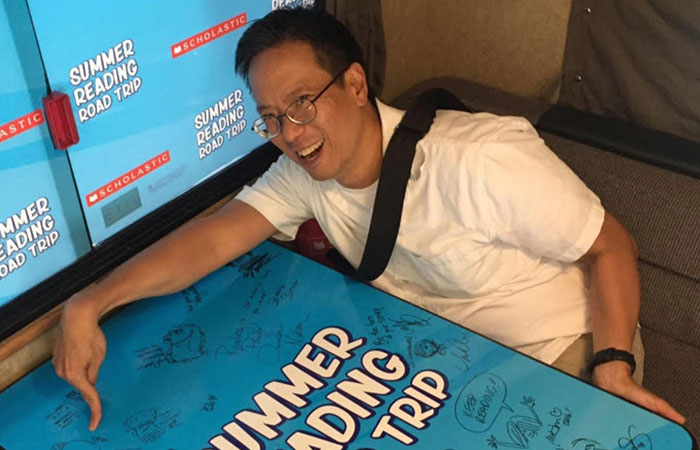
Mike Jung, author of Unidentified Suburban Object
It feels a touch hyperbolic to say I write books for 8-12 year olds because my life changed utterly and permanently during those years, but HEY, IT’S TRUE. Until sixth grade, my life unfolded in something like a reasonably smooth arc. I had my problems, of course – any kid who’s an academic super-achiever, plays with stuffed animals for years longer than his contemporaries, has something like a negative degree of athleticism, and plays the flute (an instrument typically played by girls), is probably experiencing his share of metaphorical and/or literal kicks in the pants. Still, I felt pretty good about myself. I’d been taking half of my classes a grade up for years, I was good at making art, I had a few friends…things were okay.
Then sixth grade rolled around, and the universe said “oh hey, that’s a rug under your feet, I’M JUST GONNA PULL THAT OUT, SORRY.” I was moved up a grade, a quarter of the way through the academic year, and that decision really did change the trajectory of my life, and not for the better. Things got very hard, and stayed very hard for a long time; I was relentlessly bullied, my grades crashed to earth and burst into flames, and my emotional health nearly flatlined. Things are better now. It took a while, but I’m healthier and happier, and apparently dreams do come true, because I’m an author! Who would have guessed?
Eleven and twelve were tough years, though. Maybe I write about 12 year old characters in order to keep healing. My characters share some of my personal qualities, but they’re stronger and more aware than I was. I’m still healing, all these years later. Maybe writing these books is part of that process.